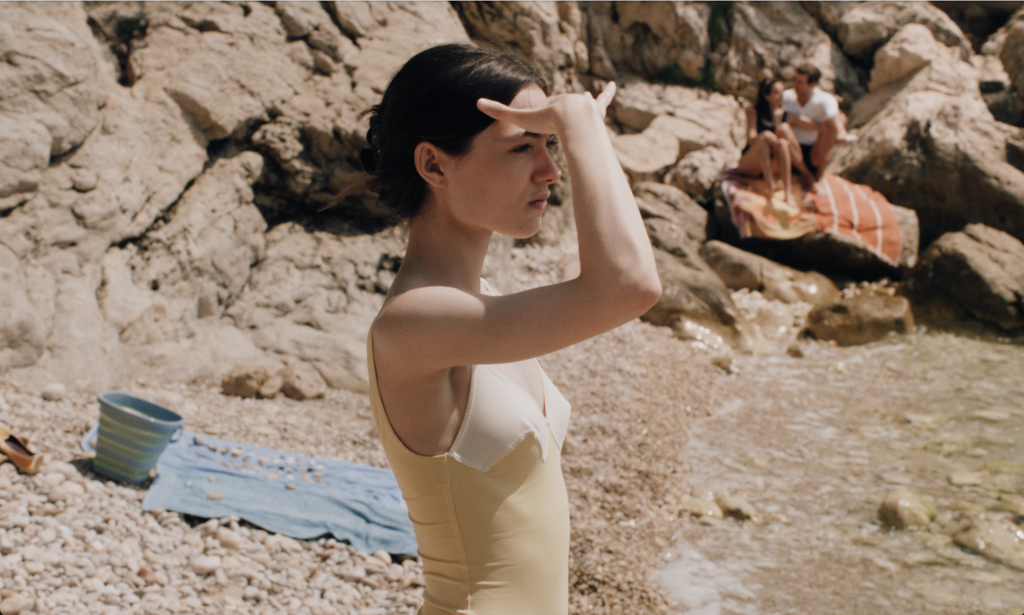【Watch Batman Begins Online】
A Very Precious Bonjour Tristesse
The Review’s Review

Courtesy of Greenwich Entertainment.
Françoise Sagan, who crashed and flipped her fabulous Aston Martin DB2/4 at high speed en route to Saint-Tropez, did not die despite getting her skull crushed beneath her British-made hatchback in Fiesta Red. She did not drown in a yachting accident on the Riviera some four years earlier, nor did she immediately go bankrupt after becoming so consumed by roulette that she personally asked the French Ministry of the Interior to ban her from domestic casinos. Her mutant capacity for indulgence, combined with her other cosmopolitan hobbies (whiskey, morphine, tax evasion), made her so much the poster girl for sixties Gallic glamour that a French newspaper once gave her the topline “un charmant petit monstre”—though a death drive that well oiled could have used something more like what Susan Sontag said about the self-destructive: “Dying is overwork.”
Sagan’s writing seems to mime the choreography of her darker impulses and lives on just as deathlessly as its author did. Her first novel, Bonjour Tristesse, published in 1954, is a disturbing little speed read about the motherless seventeen-year-old Cécile, who holidays happily with her father, Raymond, in the South of France. Quickly, the story becomes a nasty chamber play—Cécile and her daddy have this total delicious connection until a stranger threatens to ruin her paradise—and directors from now both sides of the millennium have tried to commit the catastrophe to film. The first adaptation of the book, by Otto Preminger in 1958, stars peppy Jean Seberg as our tricksy prima donna; this May, the director and screenwriter Durga Chew-Bose reanimates her by way of the hypertelerotic Lily McInerny, whose gift for the languid, googly gaze might suggest something about the way this new film is concerned not with the way things move but with how things look.
Tristesseis, to both Sagan’s and Chew-Bose’s credit, an eyeful. This is one of those French stories that lives for the sensuous and elemental—filled with the usual subatomic lustful vibrations of summer, the secret viciousness of young women, beautiful bikinis, buttered toasts. The camera watches dad and daughter pad around barefoot in their seaside rental alongside his sexy mistress Elsa—the coconut-scented bohème—until woman no. 3 in Chanel No. 5 arrives with her chilly-chic hauteur. This is Anne, friend of dead mother, menace to harmony, and here played by Chloë Sevigny. With her best WASP-y restraint, the actress reminds us that she is not from the Lower East Side but from Darien, Connecticut, blinking impassively at the Mediterranean from kitten heels on the veranda. “I knew that once she was there it would be impossible for any of us to relax completely,” Cécile says in the novel. In the film, the scenes that follow should grow tenser, make us sore—instead, the triangular dynamic of the three women grades softly in Cécile’s nisus toward vengeance. The days disappear by a sort of melting process.
Understandable that Chew-Bose, a first-time director but a longtime writer, picked this fable to remake. She may be better known as the author of tremendously sensitive essays during the post-Rookieera of online memoirists, when personal narratives privileged preciousness over persuasion. In Chew-Bose’s parlance—monstrously decadent with her verbs and wildly, even gratuitously, figurative—names “pleat her memory”; her parents’ narratives “oil her rationale.” Grafting this impulse to the screen means every bauble in the movie gets a caress—her camera lavishes crocheted bedspreads, a silver hairpin, one dazzling tomato-and-cheese sandwich. At one point in the movie, a sailboat named simply Imagescasts off into the water. “Is there anything,” Chew-Bose once asked, “better, more truthful and sublime than what cannot be communicated?”
Her airy puzzling—tender, miasmic, mannered, and broody—sits at odds with Tristesse’s natural vim. Hers is a movie Shiatsued of its evils.Where Preminger prickles, Chew-Bose cocoons. And all that Sagan lived for—her needs for speed, eros, entropy, the ultimate—dissolves into a glamorous torpor. Every stylish writer is at risk of smothering her story, but when it happens, it can’t help but feel like (here’s Sontag again) “a certain coquetry of the void.”
Mina Tavakoli is a writer from Virginia. She has written forBookforum, The Nation, theWashington Post, andNPR.
Search
Categories
Latest Posts
Man creates 11
2025-06-26 15:48The dokiWatch is a cheery smartwatch for kids that makes video calls
2025-06-26 15:36Patched Desktop PC: Meltdown & Spectre Benchmarked
2025-06-26 15:16Popular Posts
SpaceX's Starlink satellite launch in pictures
2025-06-26 17:47What it's like to show a sex toy at CES
2025-06-26 17:41Today's Hurdle hints and answers for April 17, 2025
2025-06-26 15:44Featured Posts
NYT mini crossword answers for May 12, 2025
2025-06-26 16:51What to do if you're trapped in an infinity scarf
2025-06-26 16:30Leaked photo from Chinese site claims to show Samsung Galaxy S8
2025-06-26 15:19Waymo data shows humans are terrible drivers compared to AI
2025-06-26 15:08Popular Articles
Intel's self
2025-06-26 17:00Soylent bounces back from diarrhea scandal with two new flavors
2025-06-26 16:58Newsletter
Subscribe to our newsletter for the latest updates.
Comments (882)
Inspiration Information Network
Best robot vacuum deal: Save $320 on Shark Robot Vacuum and Mop
2025-06-26 16:21Wisdom Information Network
Sony built a giant 4K projector for reading magazines
2025-06-26 16:04Exploration Information Network
Here's when Intel's standalone wireless VR headset will arrive
2025-06-26 15:52Treasure Information Network
How the internet is tracking Trump's every word
2025-06-26 15:33New Knowledge Information Network
Q&A with tendercare founder and CEO Shauna Sweeney
2025-06-26 15:12